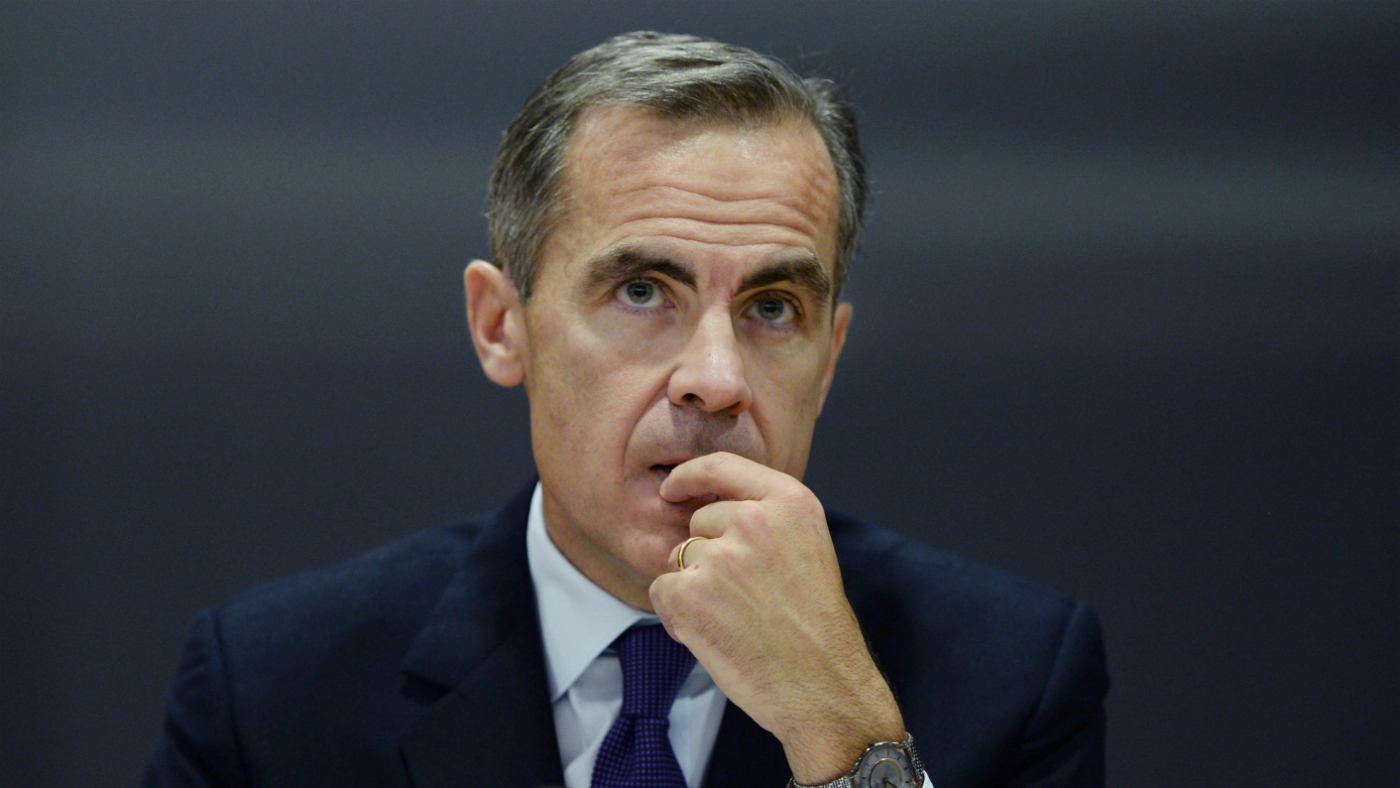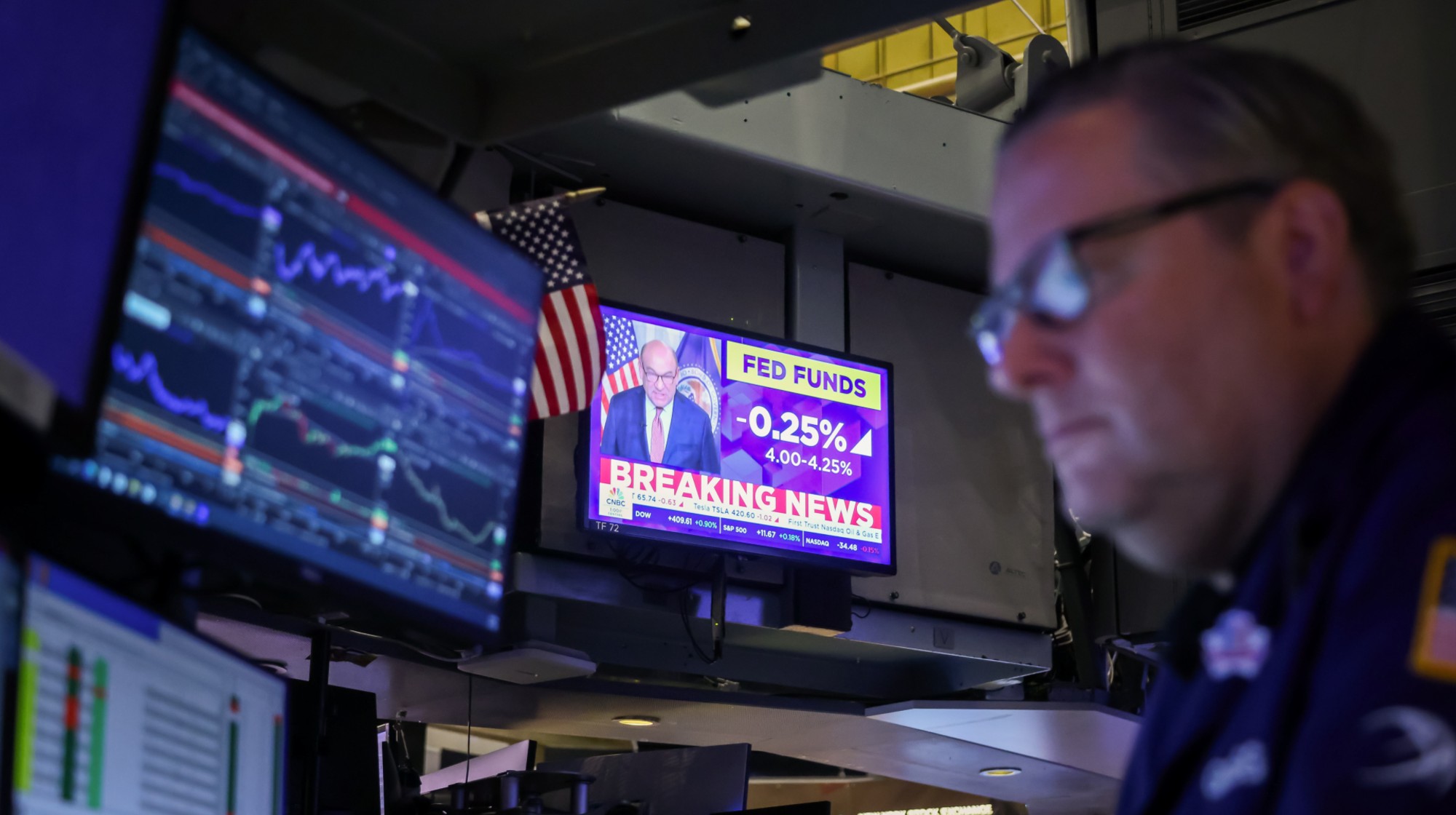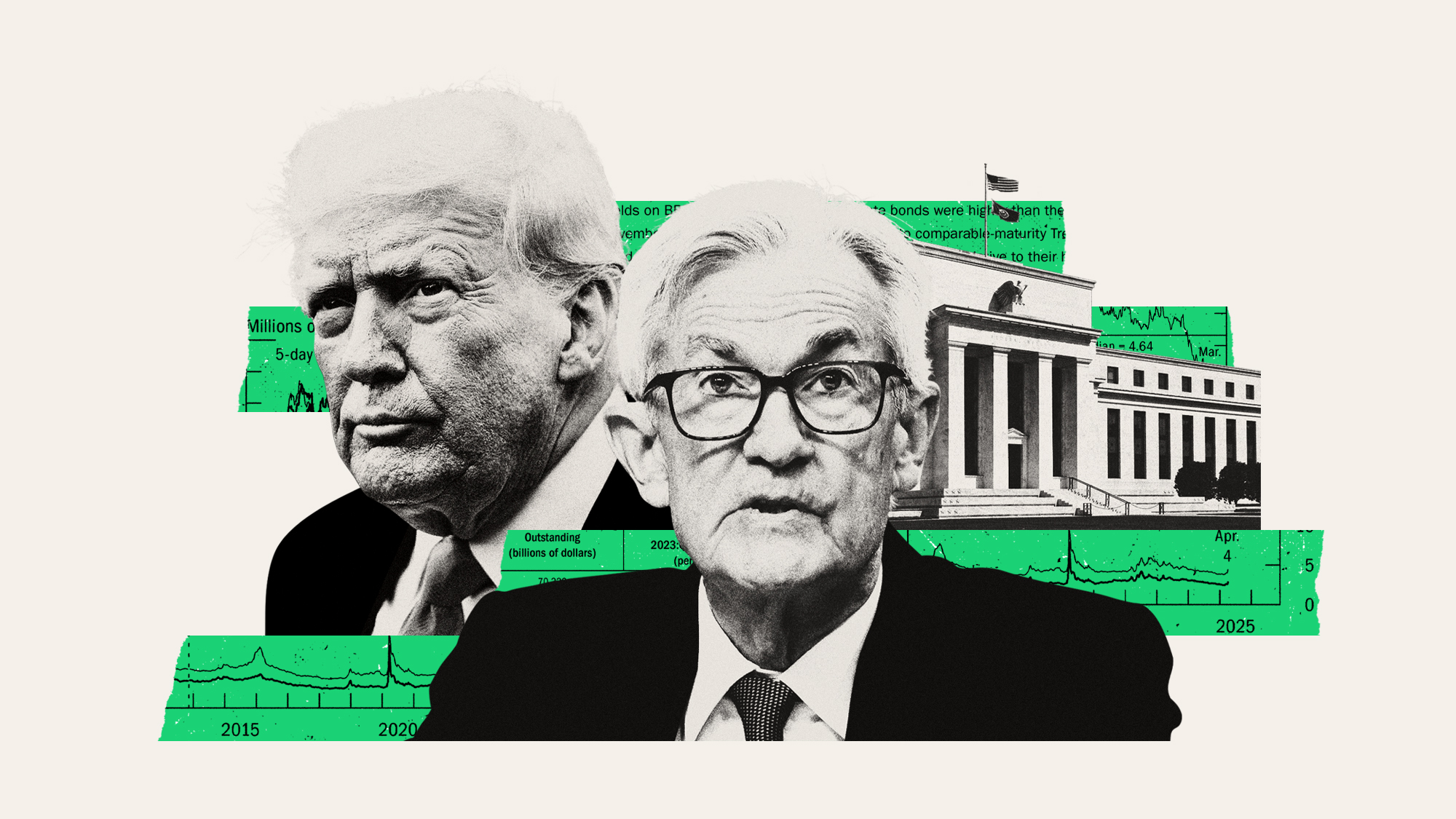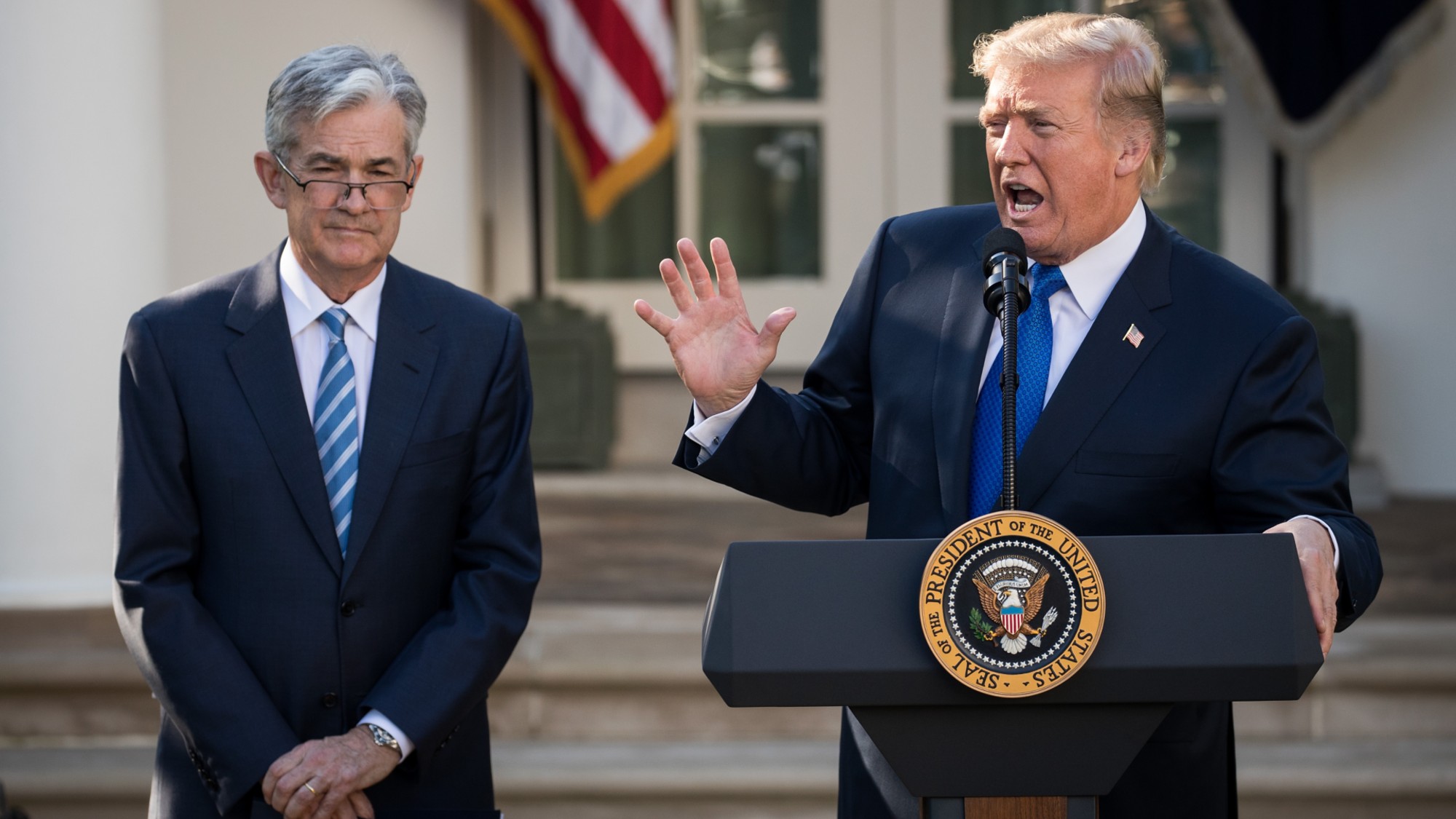Pound plunges after Bank of England's dovish rates signal
Central bank revises its growth forecast for UK economy

A free daily email with the biggest news stories of the day – and the best features from TheWeek.com
You are now subscribed
Your newsletter sign-up was successful
Why the cut in interest rates won't benefit most homeowners
15 August
Mortgage holders around the country pricked up their ears last week at the news the Bank of England was cutting the base rate from an already record-low 0.5 per cent to 0.25 per cent.
Most homeowners assume they will benefit from this rate cut, either through an immediate cut to their variable rate mortgage or through more competitive deals when they come to remortgage.
The Week
Escape your echo chamber. Get the facts behind the news, plus analysis from multiple perspectives.

Sign up for The Week's Free Newsletters
From our morning news briefing to a weekly Good News Newsletter, get the best of The Week delivered directly to your inbox.
From our morning news briefing to a weekly Good News Newsletter, get the best of The Week delivered directly to your inbox.
But, experts are saying most homeowners will see no benefit from the rate cut. Here’s what is going on.
Which mortgage rates will fall?
If you are one of the 1.5 million borrowers with a "tracker" mortgage that is set in direct relation the Bank of England base rate, then your bills will fall by 0.25 per cent.
"Anyone with a £150,000 mortgage should be about £20 a month better off," says Victoria Bischoff in the Daily Mail.
A free daily email with the biggest news stories of the day – and the best features from TheWeek.com
However, the number of people taking out tracker mortgages has fallen in recent years after repeated warnings of a rate rise saw many homeowners choose the safety of a fixed-rate mortgage.
Which will stay the same?
Of course, existing fixed rate deals won’t fall as a result of the base rate cut. If you're locked in to a rate you will have to wait until your fixed term ends to seek a better deal.
Today, half of mortgage-holders have a fixed-rate deal, compared to only a third the last time the base rate was cut in 2009.
But, many people may be surprised to discover that their variable rate mortgage may not fall either.
A third of borrowers are on their lender’s standard variable rate (SVR). It is this that fixed-rate borrowers fall back on when their term ends if they don't remortgage - and while it does move, the bank is not obliged to track the base rate.
This time around, banks are taking time to consider whether they'll pass on the cut as the general effect of the low-rates environment is a squeeze on their profit margins.
“With mortgage rates already low and savings rates at rock bottom levels, banks have said they face a hit to profits as the gap between what they can pay savers and charge borrowers narrows,” says Hilary Osborne in The Guardian.
“Lloyds has said it will take a £100m knock to profits. HSBC expects a $200m (£150m) reduction in its annual profits.”
With many banks hesitating to cut their SVRs and a lot of homeowners on fixed deals, the majority of mortgage holders will not see their monthly bills drop.
What does the Bank fo England say?
Governor Mark Carney has made his position clear. “The banks have no excuse not to pass on the cut in the bank rate,” he has stated.
In particular, he points to a new "term funding scheme" the bank has launched. Worth £100bn, it will offer banks access to super-cheap financing to lend to homeowners (among others), which should help to hold up their profit margins.
This pressure helped to sway intial hold-outs Royal Bank of Scotland into passing on the cut in its SVRs and the likes of Barclays, Santander, HSBC, Lloyds and Nationwide had already agreed to do so.
But Bank of Ireland, Halifax and Yorkshire Building Society are among the lenders yet to announce whether they will cut rates for their borrowers, notes the Daily Telegraph.
Should I switch to a tracker?
With another rate cut possible before the end of the year, many mortgage holders may be considering if this is the time to jump to a tracker deal.
“While trackers look tempting, most homeowners would save more with a fixed-rate loan,” says Bischoff.
This is because many banks have put up their tracker rates now, but fixed-rate deals are still extraordinarily cheap.
There are several deals that are “so low they are cheaper than the top trackers and you benefit from knowing your repayments will be low for years,” says Bischoff.
Fixing for longer periods of, say, five years also means you are protected should rates have to rise rapidly in the next couple of years to counter rampant post-Brexit inflation.
Which are the best deals?
If you are free to remortgage – check to see if you would have to pay any exit penalties – then now is a great time to shop around for a better deal.
Finding the right mortgage is a very personal thing as you need to find a deal that is available to you based on the loan-to-value of your home loan and a lender whose criteria you meet.
Your loan-to-value (LTV) is the amount you want to borrow expressed as a percentage of the value of your home. So, if you house is worth £200,000 and you need to borrow £150,000 then your LTV is 75%.
These are the best deals around at the moment:
- HSBC’s two-year fixed rate mortgage has a rate of 0.99%. The maximum LTV is 65%.
- HSBC’s five-year fixed rate mortgage has a rate of 2.99%. The maximum LTV is 80%.
- Coventry Building Society is offering a 10-year fix with a rate of 2.49%. The maximum LTV is 65%.
- Tesco Bank has a two-year tracker rate of 1.22% with a maximum LTV of 60%.
Interest rates 'to be cut closer to zero before Christmas'
12 August
Interest rates will be cut close to zero in November as the country slips into a "mild" technical recession following the uncertainty raised by the vote for Brexit, according to a poll of economists.
Respondents to the Reuters survey say the Bank of England, which last week slashed interest rates to a record low of 0.25 per cent, will be forced into further action by the end of the year and will cut the base rate to 0.1 per cent.
Policymakers hinted at that move in the statement accompanying their latest decision, while governor Mark Carney has insisted the UK will not go further and follow other central banks by setting rates below zero.
The Reuters group also said the bank would resist buying more bonds under its QE programme on top of the £70bn announced last week. This might reflect waning appetite from banks that could have been shown by an undersubscribed auction earlier this week.
However, despite the monetary policy action, the experts see the UK slipping to marginal negative growth of 0.1 per cent in the third and fourth quarters. A recession is defined as two consecutive three-month periods of contraction.
"The recession will largely be driven by sharp falls in business investment," said Samuel Tombs at Pantheon Macroeconomics. "Most firms will hold off investment until there is a bit more clarity over whether we are likely to remain in the single market."
The National Institute of Economic and Social Research think-tank said this week the economy had already receded by 0.2 per cent in July, reports The Independent.This is in line with its previously-stated forecast for negative growth of 0.2 per cent for the third quarter as a whole.
But while the institute now puts the chances of a technical recession in the next year at "evens", its model shows this will be narrowly avoided, with 0.1 per cent growth in the final three months of the year.
The Bank of England, in its own forecasts, also predicts the UK will avoid recession, but its downgrade for expansion next year, from 2.3 to 0.8 per cent, is the most severe since it gained independence in 1997.
Interest rates: First Direct triggers race to bottom for savers
12 August
Savers are losing out by more than might have been expected from the latest Bank of England (BOE) interest rates cut, with one of the country's biggest banks triggering a race to the bottom on cash returns.
HSBC's telephone and online subsidiary First Direct has told customers it will be reducing the interest offered on a range of accounts from 18 October, including slashing its cash Isa rates by 0.4 per cent.
That will see the rate fall from 1.3 to 0.9 per cent, The Guardian reports, while the rate on its bonus savings account will be chopped from 0.75 to 0.4 per cent.
These reductions are more severe than the BOE's 0.25 per cent cut to the base rate last Thursday. First Direct says the moves reflect "recent market activity".
Other banks, especially smaller lenders, who had been attracting excessive sums during a period of low rates on the high street, are following suit, with some pulling top-paying accounts altogether.
Marsden Building Society cut the rate on its easy access direct saver from 0.65 to 0.25 per cent and its easy access branch saver from 0.7 to 0.4 per cent. Skipton Building Society has closed its 2.01 per cent five-year bond to new customers and relaunched it at a lower rate of 1.5 per cent.
After reducing the base rate in a bid to prevent a post-Brexit recession, BOE governor Mark Carney told banks and building societies he expected them to pass on the rate cut to borrowers and offered a £100bn fund to help this.
This "term funding" scheme is designed to reward banks for lending by offering cheap financing, in the process protecting profit margins that would otherwise be squeezed by the rates cut.
Customers with mortgages and savings rates pegged to the base rate are automatically guaranteed a cut, but those with mortgage rates set by lenders are waiting to see if the cut will be passed on.
Most lenders, with the notable exception of state-backed Lloyds, have said they will reduce their standard variable mortgage rates, which kick in for those on fixed rates at the end of their offer term.
Will the interest rate cut boost the post-Brexit economy?
8 August
On Thursday the Bank of England’s Monetary Policy Committee announced it was cutting interest rates from 0.5 per cent, the record low at which they have sat since 2009, to 0.25 per cent.
This comes in addition to a £170bn economic stimulus package aimed at preventing the UK falling into a recession. The Bank will create a £100bn "term funding" scheme to push banks to pass the low interest rate on to customers, and also buy £60bn of UK government bonds and £10bn of corporate bonds to boost liquidity in the economy.
Why the interest rate cut?
The hope is that the cut, alongside the other measures, will boost the UK economy, in the wake of a raft of data showing the Brexit vote shock has triggered a potentially sharp slowdown.
In its own inflation report, also published on Thursday, the Bank of England made the largest single downgrade in growth forecasts in its 19 years of independence, from 2.3 per cent next year to just 0.8 per cent.
In short, lower rates means the cost of borrowing money is reduced, which should encourage the likes of small businesses to take out loans to fund expansion, or prospective homeowners to take out a mortgage.
“We took these steps because the economic outlook has changed markedly, with the largest revision to our GDP forecast since the MPC was formed almost two decades ago,” Mark Carney, governor of the Bank of England said when announcing the rate cut.
“By acting early, the MPC can reduce uncertainty, bolster confidence, blunt the slowdown, and support the necessary adjustments in the UK economy.”
This was widely expected wasn’t it?
Yes, and no. The rates cut was expected, as was more bond-buying, known as quantitative easing. But the new lending scheme, coupled with forward guidance that interest rates could yet be cut to 0.1 per cent, made the package far more extensive than many had anticipated.
“This is further than the bank was expected to go,” says Simon Jack on the BBC. “Although a cut of a quarter of a percent was not a surprise, a specific message that it could fall further towards zero by year end was unexpected…it is clear the Bank of England has real concerns about the economy.”
Will it work?
The Daily Mail’s Alex Brummer thinks a rate cut might help.
“Lower interest rates should support house buyers and consumers by lowering the cost of mortgages and other forms of credit,” he says. “It ought also to benefit Britain’s smaller businesses by making it cheaper to expand.”
With the economic future hard to predict and Brexit throwing in plenty of uncertainty, “the Bank of England is taking decisive action designed to avert recession,” adds Brummer.
“Mark Carney has acted more boldly than anyone could have imagined…[and] in effect produced a huge insurance policy aimed at keeping the wheels of British enterprise turning. We now have to pray it works.”
Others are far more doubtful. The problem is the Bank of England can increase the supply of credit, but it can’t do anything about a lack of demand if businesses and consumers retrench.
“Britain is suffering from a classic liquidity trap,” says Simon Jenkins in The Guardian. “There is insufficient demand. Yet all the Bank of England did on Thursday was wring its hands, blame Brexit and go on digging the same old holes…Those policies have been in place for some seven years. They have failed, failed, failed.”
Put together all the Bank’s new policies and “it looks like a giant economic sledgehammer, albeit a touch smaller than the 2009 version,” says Ed Conway in The Times. “Like most sequels, this one leaves you feeling a bit empty.”
The problem, Conway explains, is that no-one really knows who will benefit from a rate cut.
Normally, “the answer is straightforward: good for borrowers, bad for savers.” But, since 2009, the number of people on tracker mortgages – ones that move in line with base rate movements – has reduced dramatically. This is partly because people have been encouraged, by the Bank of England no less, to move on to fixed rate mortgages to protect against an interest rate rise.
Is the rate cut pointless then?
“Most economists remain convinced that the Bank’s plan, big and bombastic as it looks, will make little profound difference,” says Conway.
It might, however, have symbolic value that could buy time for the government to follow up with some more direct economic stimulus. Certainly markets were buoyed: the FTSE 100 has surged to above 6,800 since the Bank's announcement, marking its highest point since last May.
What the interest rate cut to 0.25% means for you
5 August
On Thursday the Bank of England cut interest rates from 0.5 per cent to 0.25 per cent, a new record low. It was part of a £170bn package of monetary stimulus designed to avert a post-Brexit-vote recession.
The move will benefit homeowners who have tracker mortgages - that is to say, mortgages whose repayment rate tracks underlying interest rates.
If you have a £200,000 repayment loan on a tracker mortgage, your monthly payment could fall by £24.16. If it's an interest-only loan it should fall by £41.66.
Remember to check the small print, though. Some lenders say they won't reduce rates beyond a certain level, while others use a rate, for example an inter-bank lending rate, that may not mirror that of the Bank of England.
More than half of home loans are on fixed rates for a set term, too, so these homeowners won't benefit for a while.
The cut is, of course, bad news for savers, who have already endured more than half a decade of low rates.
The average interest rate on an easy access savings account is 0.65 per cent. Mirroring the fall in the Bank of England's rate, that average would drop to 0.4 per cent.
"For anyone with £10,000 saved in such an account, they will receive £40 a year in gross interest, which is £25 less than before the cut," notes the BBC.
If you're claiming a state pension, nothing will change. But annuities could be affected because they're priced in line with UK bonds, which are likely to offer lower yields.
This is especially so since the Bank unveiled another £70bn of bond purchases to boost liquidity.
And if you plan to go abroad soon, you should know that the already-embattled pound, hit in recent weeks by the Brexit vote, suffered another fall when the Bank announced the cut.
-
 How the FCC’s ‘equal time’ rule works
How the FCC’s ‘equal time’ rule worksIn the Spotlight The law is at the heart of the Colbert-CBS conflict
-
 What is the endgame in the DHS shutdown?
What is the endgame in the DHS shutdown?Today’s Big Question Democrats want to rein in ICE’s immigration crackdown
-
 ‘Poor time management isn’t just an inconvenience’
‘Poor time management isn’t just an inconvenience’Instant Opinion Opinion, comment and editorials of the day
-
 Powell: The Fed’s last hope?
Powell: The Fed’s last hope?Feature Federal Reserve Chairman Jerome Powell fights back against President Trump's claims
-
 The end for central bank independence?
The end for central bank independence?The Explainer Trump’s war on the US Federal Reserve comes at a moment of global weakening in central bank authority
-
 Who will be the next Fed chair?
Who will be the next Fed chair?Today's Big Question Kevin Hassett appears to be Trump’s pick
-
 Should Labour break manifesto pledge and raise taxes?
Should Labour break manifesto pledge and raise taxes?Today's Big Question There are ‘powerful’ fiscal arguments for an income tax rise but it could mean ‘game over’ for the government
-
 What are stablecoins, and why is the government so interested in them?
What are stablecoins, and why is the government so interested in them?The Explainer With the government backing calls for the regulation of certain cryptocurrencies, are stablecoins the future?
-
 Fed cuts interest rates a quarter point
Fed cuts interest rates a quarter pointSpeed Read ‘The cut suggests a broader shift toward concern about cracks forming in the job market’
-
 Trump's threats to fire Jerome Powell are unsettling the markets
Trump's threats to fire Jerome Powell are unsettling the marketsTalking Points Expect a 'period of volatility' if he follows through
-
 How will Wall Street react to the Trump-Powell showdown?
How will Wall Street react to the Trump-Powell showdown?Today's Big Question 'Market turmoil' seems likely